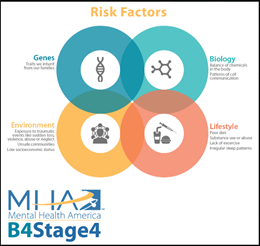Like other mental illnesses, no one can pinpoint exactly why any one person has psychosis. You might be trying to identify the root causes of psychosis. Or, you may be working through your feelings about it—feelings like guilt, shame, or confusion. For many of us, the question we’re really asking is something like, “Why is this happening to me?” or “Why did God give me psychosis?”
These questions are common for people when they first start struggling with a mental illness. You might struggle to accept your experiences, wish they might go away, or wonder why they’re happening at all. You can think of this as grieving the loss of the “normal” life you wish you could have. People are looking for answers to make sense of negative feelings, thoughts, or experiences.
There is nothing you’ve done that made you have psychosis. Having a mental illness is not your fault. There’s no single explanation—multiple factors contribute to developing symptoms of psychosis. These factors include our genetics, biology, environment, and lifestyle. There are some things you have no control over at all (your genes), and other things you have more control over (your lifestyle choices).

Learning about mental illness and accepting that this is part of your life is a process. On some days, it will be easier to understand and accept that you have a mental illness. On other days, you’ll feel big feelings (normally sadness and anger) about this part of your life. Like any type of grieving, acceptance becomes easier over time.
Acceptance is one of the first steps to recovery. When you are able to accept and understand the things you are experiencing, it becomes more comfortable to start working on the things you can control. Fortunately, there are many ways to treat psychosis. These treatments aren’t a cure, but they can help you continue to live a good and happy life while coping with your symptoms.
"*" indicates required fields
"*" indicates required fields
"*" indicates required fields
"*" indicates required fields
